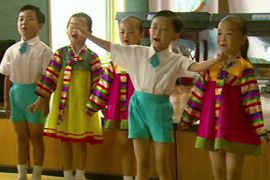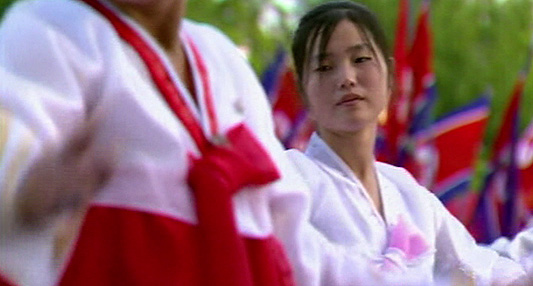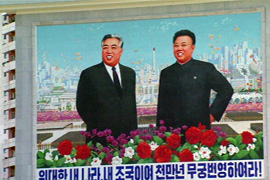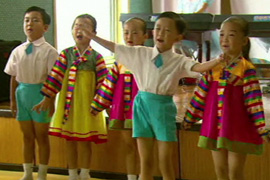Life in a ‘nanny state’
North Korean leaders past and present guide the lives of citizens.

 |
| North Korea is eager to portray itself as the last remaining socialist paradise |
“Kim Jong-il gives guidance over artistic activities” is the headline in the Pyongyang Times when we arrive, in a report on the visit of General-Secretary Kim to the Pyongyang University of Fine Arts.
It seems nothing happens in the Democratic People’s Republic of Korea without the good advice of the Dear Leader or his father, the Great Leader, Kim Il-sung.
| In Video |
The elder Kim died 13 years ago, but he remains North Korea’s “eternal president” and his political philosophy of self-reliance – known as “juche” – dominates all aspects of life.
During the course of our week-long visit, we are constantly reminded of their good deeds in what they call the last remaining socialist paradise on Earth.
The capital’s subway network was built after initiatives by “the Great Leader”, we are told.
Not only that, the West Sea barrier construction was only possible because of Kim Jong-il’s engineering brilliance.
 |
| The two Kims dominate all aspects of life in North Korea |
And if that was not enough, both of them, through their understanding of advanced farming methods, have been able to vastly increase the amount that farmers produce from the land.
North Korea is the ultimate “nanny state”.
You cannot even look at a painting without the nation’s leaders telling you what to think.
It is very strange to spend a week as a reporter in a country where nobody seems to question the way they live, or the way their lives are run.
Of course, we know that some North Koreans do question the state and its leaders, otherwise there would be no need for Yoduk, or the other prisons that exist to house political opponents of the government.
‘Revolutionary success’
There was no question of us getting close to the dissidents, or anyone else, during our trip, as we were shuffled from one glorious example of Korean revolutionary success to another under the watchful eyes of our two government “guides”.
But they could not hide the fact that North Korea is a country with big problems.
 |
| North Korean children are carefully taught to spout the party line |
Shortages of energy and other essential resources are all too obvious.
At the Paekutsan Architectural institute, a draftsman slaved away over elaborate drawings for an enormous swimming pool and leisure complex.
But when I asked them where it was to be built and when it would be finished, he sheepishly admitted there were no plans to start construction.
Similarly we were shown around an e-library where students are encouraged to use the database of 15 million technical manuals to learn about the latest developments in computer and electrical engineering.
When I asked one young man whether he found it difficult to understand the complicated computer manual he was reading, he looked at me with a blank expression on his face.
Spirit of defiance
Many North Koreans are able to read English, my minder explained – they just can’t speak it!
 |
| The Juche tower dominating Pyongyang is a monument to the country’s guiding philosophy |
Five minutes later there was a power cut, something that happened several times during our stay, and the e-library suddenly did not seem like such a good idea.
Shops glimpsed through the window of our van seemed to have stacks of processed food, but hardly any fresh produce.
Our requests to stop and look were denied.
There did seem to be a spirit of defiance and independence in many North Koreans, a pride in the fact that they have survived alone.
But is that the opinion of an ordinary North Korean?
To be honest, I don’t know. Over the course of seven full days, I don’t think I spoke to a single “ordinary” person.
